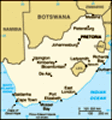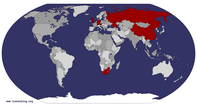Advertisement
On any trip abroad that involves flying, the first contact with the new culture usually occurs at the airport, if not somewhere in the imagery of the mind. Ours was the last flight out of Munich airport. Once I came to the departure gate, I began to notice an undertone that would follow me throughout the next month in South Africa, the one of race.
A predominantly senior crowd of Europeans gathered at the gate ready to board, greeted by an entirely African cabin crew. Once I was seated, the flight video portrayed a stout man with Teutonic spectacles boarding before a towering rotund black man, who clumsily placed his briefcase in the overhead compartment causing another one to fall out on the white man's head. Opening the in-flight magazine entitled Sawubona (a Nguni word for greetings), I noticed a similar nuance, grandiose resorts with black staff at the Casalinga Italian Ristorante, smiling bare-chested black men with drums inviting me to Kwazulu-natal province, a smiling Malawi artist holding money that a tourist just handed over for his carved wares. I realized that such imagery was an inevitable part of the journey, an invitation to explore before judging.

 World Cup fever
World Cup fever
On the highway leading away from Tambo International The magazine also provided some humor as South African Airways took time to inform the reader that blowing the obnoxiously loud horns called 'vuvuzelas' on board and unleashing colored smoke canisters is not allowed (punishable for up to 15 years!), nor are any inflatable sports balls allowed in the cabins. So much for practicing my freekicks on board. Yep, the World Cup must be upon us!
The plane smoothly traveled the 5,395 miles at 635 mph up to an altitude of 38,000 ft - once some of the fuel was burned off - crossing over Ancona, Naples, the heart of Libya, Chad, Central African Republic, and the DRC. I woke up while crossing somewhere over Zambia, but could only see a puffy blanket of clouds below as the sun began to breach the horizon to the east.
With breakfast served the stewardesses loitered in their cubby hole clicking away in Xhosa or Zulu languages. Their incomprehensible dialogue of clicks was interspersed with words like 'Didier Drogba' and 'Manchester United'. Indeed, the World Cup is definitely upon us.
I stepped out onto the tarmac of Tambo International airport and turned around at the wonder
of a sunny morning on the African continent. I noticed that changing hemispheres while not changing time zones can have a disorientating effect when you're so used to a change of distance meaning a change of time as a trans-Atlantic traveler.
I passed through passport control and customs with ease, smiled at a group of chanting Brazilian soccer fans, gawked at the price of the official World Cup paraphernalia, waited several minutes for my suitcase to pop out of the belly of the airport, and cruised through the sliding doors into the realm of Jo'burg.
My senses went on high alert fueled by the negative image of violence in South Africa in the media. I had even heard that I'll be fine as long as I don't go to the bathroom at the Jo'burg airport, lest I want to get robbed. I caught up with my host after several minutes of waiting and looking around the motley crowd of people assembled at the gate. My flight wasn't listed on the screen for some reason so both of us were in the dark about whether we were in the right place. Although, he later admitted being distracted

 Soccer City
Soccer City
Still not completely finishedby a group of Latino and Brazilian women coming through the gates.
He led me to his car, where I accidentally tried to enter the driver's seat, to my host's amusement. We exited the car park and out onto one of the wide stretches of recently improved highways lined with flags of World Cup-qualified nations. As we drove into the suburbs towards his place, he reiterated what I had heard about the security situation in South Africa.
“It's like anywhere else, you just have to be careful. There's always a little bit of truth to all the hype, but you shouldn't believe all of it.”
Much of Gauteng province (including Jo'burg and Pretoria) resembles the outskirts of any major American urban center. The suburbs sweep out between the two metropoles, joined by wide four-lane roads and faster highways, and dotted with 'trading centers' and estates. Numerous black Africans congregate at the intersections, some selling national flags and other knock-off World Cup paraphernalia, while others sit around on the roadside and wait to get picked up for work as a gardener, mine worker, or housekeeper. The estates themselves are high-security complexes with a gate and
an encompassing fence with barbed wire and sensors. Once inside, the comfortable domestic life is in sharp contrast to the scene outside: elegant furnishings in a modestly sized house, usually a pool, a braai (grill) and many seating arrangements for when guest and friends come over. In fact, as my host put it, all a house needs is a pool and a braai; if it has a kitchen, bedroom and water closet, that's nice too.
Security is a constant concern for the affluent white communities. We visited a friend of one my hosts who lived on an individual plot of land with his own security fence, as opposed to an estate. As we stepped out into his sloping backyard with a pool and tropical plants, he explained to us his situation. In the three years he has lived there he has been robbed 11 times, most recently the previous Saturday. Pointing at the rear fence, he indicated how the thieves had entered from the side road and through the adjacent undeveloped plot of land. Over a few beers in the warm winter sun, he explained that tn that heist, the occupants of his guest quarters had left for 45 minutes, enough time for the thieves to enter from the side street, hop the fence, and nab the laptop, television, any other valuables, and the Nintendo that the young boy was saving money to buy a new game for.
“It must be an inside job,” my host contends, as we drove away from his house.
“But doesn't that create a trust issue?” I asked.
“That's the thing, you can never really trust anyone. I'd rather have someone who is trustworthy than some guy who can work hard and get the job done.”
My host's housekeeper seems to be that type. She's a soft-spoken gentile woman from Soweto. Always smiling and sincere, she replies to your question as if it's a command. “You need coffee, sir?” Well, I would just like some... don't need it. She keeps the place spotless and finds enough housework throughout the day to keep her occupied. I had seen a similar domestic situation in Brazil, where the affluent hire housekeepers, cooks and gardeners not necessarily out of laziness, but in order to provide jobs for the less affluent.
After a long day of driving the roads for various errands, the evening time came: the best excuse for a braai! Friends came over and brought beverages of their choice for a grill. The well-seasoned meat, purchased from a large specialty butcher shop, included spicy chicken, pork, thick slabs of crispy bacon, and 'boerewors' sausage in a spiral form.
In spite of all of the soccer hype, one can't forget that for much of the white South African population, the sport of choice is rugby. I had watched Invictus on the plane which chronicles the story of the 1995 South African Team that won the World Cup a year after the abolition of apartheid, and united the population. I was curious about two of the guests' impressions of the film. Neither had seen it. In fact, I would meet few South Africans who had seen the film. Who needs to when you have experienced the real thing? After explaining the gist of the film, which portrays Nelson Mandela as instrumental in arousing governmental support for the rugby team as well as installing confidence in captain Francois Pienaar, I watched my host and a friend get into an argument about how vital his role was. Contrary to the film, some believe it was Pienaar who was the force behind the squad and that Mandela was just an internationally renowned figurehead that could take the praise (or brunt) of any result.
A sort of 'Invictus, part deux' had happened the previous weekend when a big match between two of the provinces had to be held in Soweto. For thousands of white South Africans, this was their first time stepping foot into the Black township. Many feared the worst, as is the case now with the World Cup. In the end, the opposite occurred. It was a joyous celebration of whites and blacks streets away from where Nelson Mandela and Desmond Tutu were born, a party that carried on into the night without a problem. Did the rest of the world hear about it?
“We were all disappointed. Here was a chance to create a positive image of South Africa and it went largely unnoticed.”
The NY Times finally picked up on it a few days later: http://www.nytimes.com/2010/06/02/world/africa/02soweto.html
The chill of the African winter night finally set in, after a day of wearing short sleeves. The locals had asked if I was cold to which I replied, "Guys, I live in Austria." Funny how 20 degrees is cold for them. As the embers of the braai subsided, we all made our separate ways to bed. I had the feeling this was only the beginning of a month of surprises.
Advertisement
Tot: 0.092s; Tpl: 0.013s; cc: 10; qc: 52; dbt: 0.0558s; 1; m:domysql w:travelblog (10.17.0.13); sld: 1;
; mem: 1.2mb









